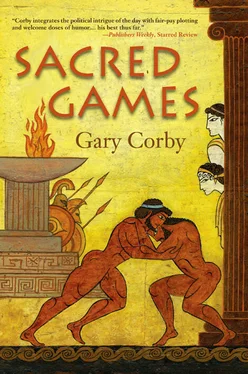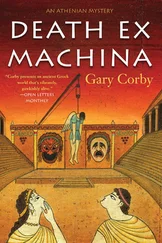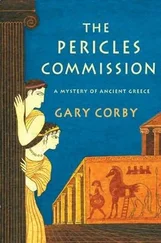Gary Corby - Sacred Games
Здесь есть возможность читать онлайн «Gary Corby - Sacred Games» весь текст электронной книги совершенно бесплатно (целиком полную версию без сокращений). В некоторых случаях можно слушать аудио, скачать через торрент в формате fb2 и присутствует краткое содержание. Год выпуска: 2013, ISBN: 2013, Издательство: Soho Press, Жанр: Исторический детектив, на английском языке. Описание произведения, (предисловие) а так же отзывы посетителей доступны на портале библиотеки ЛибКат.
- Название:Sacred Games
- Автор:
- Издательство:Soho Press
- Жанр:
- Год:2013
- ISBN:978-1-61695-228-0
- Рейтинг книги:3 / 5. Голосов: 1
-
Избранное:Добавить в избранное
- Отзывы:
-
Ваша оценка:
- 60
- 1
- 2
- 3
- 4
- 5
Sacred Games: краткое содержание, описание и аннотация
Предлагаем к чтению аннотацию, описание, краткое содержание или предисловие (зависит от того, что написал сам автор книги «Sacred Games»). Если вы не нашли необходимую информацию о книге — напишите в комментариях, мы постараемся отыскать её.
Sacred Games — читать онлайн бесплатно полную книгу (весь текст) целиком
Ниже представлен текст книги, разбитый по страницам. Система сохранения места последней прочитанной страницы, позволяет с удобством читать онлайн бесплатно книгу «Sacred Games», без необходимости каждый раз заново искать на чём Вы остановились. Поставьте закладку, и сможете в любой момент перейти на страницу, на которой закончили чтение.
Интервал:
Закладка:
One driver in the middle of the pack was too aggressive, or misjudged the turn, or perhaps his team was spooked by the curse of Taraxippus. His left wheel caught the turning post and tore off. The wheel bounced high into the air and flew into the crowd at the far end, where it struck down several spectators. The chariot overturned to the right, spilling the driver, whose right arm was caught in the reins. The chariot twisted and broke its coupling and tumbled into the altar, where it smashed to pieces. The driver somersaulted in the air and hit the ground headfirst. His unconscious body was tossed to the side like a broken doll while his team continued to race inside the pack. Directly behind came Iphicles. He had no time to swerve. His horses trampled the fallen driver, and then his wheels drove over the body. If the driver hadn’t been dead when he hit the ground, he certainly was now. Iphicles’s chariot swerved from side to side over the uneven bump, and for a moment I thought he would tumble, too, but Iphicles pulled with one arm and then the other, using his main strength against the tension in the reins and the pressure of his feet on the platform to stabilize his vehicle. Everyone shot by as he swerved to the outside to regain control. Men cheered his skill.
“Good driving,” Markos said, and I had to agree. He’d lost time, but Iphicles had done well to stay in the race. The moment the last driver had passed, a recovery team ran onto the course to drag away the corpse and manhandle the driverless horses to the side. Another group picked up as many pieces of shattered chariot as they could before the racers returned from the other end.
The first turn forced the pack to string out. Corinth was in the lead; neck and neck behind them were Argos and Cyrene.
As they approached the turn, the Corinth driver hauled hard on his left rein and threw his body to the inside. His chariot actually rose on its inner wheel, and for a moment the crowd gasped as we all thought he’d fall. But his outer beasts were pulled, and the chariot almost spun on the spot. When it righted with a bounce, the chariot had turned on a drachma and the driver whipped the team into a sprint down the straight.
Men in the crowd beat one another in excitement and screamed.
Cyrene was to the outside of Argos. As things stood he was certain to come out of the turn third, but the Cyrene took aim for the corner and whipped. He cut across the path of Argos, and the Argos driver had a choice: ram his opponent or brake. His nerve failed for an instant, and he hauled reins. It was a tight squeeze; the Cyrene got around first, but his momentum took him out wide and the slower Argosian made the tighter turn. When they straightened, Cyrene was ahead by a neck. Both drivers whipped their horses as if they didn’t care whether they lived or died-in the lust for victory, they likely didn’t.
Athens had forced his way through the center of the pack. Cyrene pulled ahead to a clear second.
Athens led the main pack and made the second turn without incident, but the chariot immediately behind flipped. The driver screamed as his flimsy vehicle slammed into the team coming up on the outside and sent them both into the outer wall, a tangled wreck of thrashing horses.
Recovery teams ran out to retrieve what they could. I saw one driver still move as they carried him off. The other dangled limp between two men. Three men with swords appeared and finished the horses with broken legs. They sliced the harness so the survivors could be stood to walk off. The owners must have cried. A fortune in pedigree beasts had been reduced to dog meat. Indeed several dogs had already smelled the blood and hovered at the edge of the ring. An attendant chased them away.
The other teams had to rein in or join the wreckage. They lost time edging about the inside.
The dust rising from the hippodrome had enveloped the racers. Now the slight breeze carried it over the crowd, and men sneezed as they screamed. Tears ran down our cheeks. Markos beside me gasped and banged on his chest. I looked at him in alarm, but he shook his head.
“Don’t mind me. This always happens when the air is thick. I’ll be better when it clears.”
Corinth-Cyrene-Argos-Athens. Then a confused mêlée of teams, and Iphicles of Thebes bringing up the rear.
But Iphicles had an advantage over every other team: there was no one to interfere with his drive; he accelerated into the race as if it were an exercise.
Iphicles caught up with the main pack over the next six laps-there are twelve in all, plus the half lap to start. As he did so, Iphicles passed the rapidly growing tail of failed teams: teams with horses lamed in the scrimmage; chariots with damaged wheels, so easy to happen in the grind of the pack; teams that couldn’t maintain the punishing pace set by the leaders; and teams whose drivers had failed at this ultimate test, unable or afraid to compete against the best of the best. None of the failures would give up, but soon they would be lapped.
Iphicles passed all these and by the next turn was at the back of the pack. Markos wheezed but watched in intense concentration.
At the next turn Iphicles came out wide and whipped his team like a madman. He surged past all the main pack but the team from Chios, leading the group, which saw Iphicles pass and charged with him. Thebes and Chios were half a lap behind the leaders. The Athenian must have heard the renewed cheers of the crowd, because he looked behind him-something even I knew you should never do-to see the challenge coming fast upon him.
Iphicles’s chariot seemed to stagger for a moment. Then suddenly his outer wheel came loose and ran alongside before it veered to the right and sped out of the hippodrome and into the crowd. A few spectators were bowled over.
I gasped. So did everyone else.
The disaster happened so slowly it was like watching a shipwreck rather than a chariot crash. Iphicles had automatically flung himself to the left, so his weight was over the remaining left wheel. I supposed he’d endured such an accident in training, because his response was immediate. He kept his balance long enough that some fools in the crowd thought he could stay that way and cheered him on. Inevitably the remaining wheel wobbled over a piece of wreckage that lay in the dirt, and Iphicles was flung off.
He didn’t let go of the reins. Iphicles looked back and saw his danger. The Chian team was right behind him and behind the Chian, a small pack of chariots that couldn’t see him in the dust and wouldn’t stop even if they could. If Iphicles let go, they would run him over and serve out the same fate he himself had delivered to the first man to fall.
The frightened horses dragged Iphicles along the ground, tearing away his skin, but he was still conscious and held on to avoid being trampled. The pain must have been excruciating.
The turning post at Taraxippus was coming up fast. If he didn’t do something, his horses would slow at the end, and Iphicles would be crushed, if the drag didn’t kill him first. All the Hellenes watched, almost silent despite the race, as Iphicles the charioteer fought for his life.
My witness was about to die.
“Come on!” I said to Markos. I jumped over the low wooden fence that served as barrier.
“What are you doing?” Markos shouted at me.
“That’s our witness out there. You want to lose him?” I ran for Iphicles.
“Nicolaos, you idiot, wait!” Markos cursed, jumped the barrier and ran after me.
Iphicles had fallen near the hippodrome’s entrance, but we were closer to the Taraxippus end. If I ran at an angle, I could catch them despite their speed. I picked a spot by eye and ran for it. The Chian had seen Iphicles’s disaster ahead of him, but that wasn’t going to stop him from driving straight for the turn. It was a question whether I could reach Iphicles before the Chian horses trampled him.
Читать дальшеИнтервал:
Закладка:
Похожие книги на «Sacred Games»
Представляем Вашему вниманию похожие книги на «Sacred Games» списком для выбора. Мы отобрали схожую по названию и смыслу литературу в надежде предоставить читателям больше вариантов отыскать новые, интересные, ещё непрочитанные произведения.
Обсуждение, отзывы о книге «Sacred Games» и просто собственные мнения читателей. Оставьте ваши комментарии, напишите, что Вы думаете о произведении, его смысле или главных героях. Укажите что конкретно понравилось, а что нет, и почему Вы так считаете.












